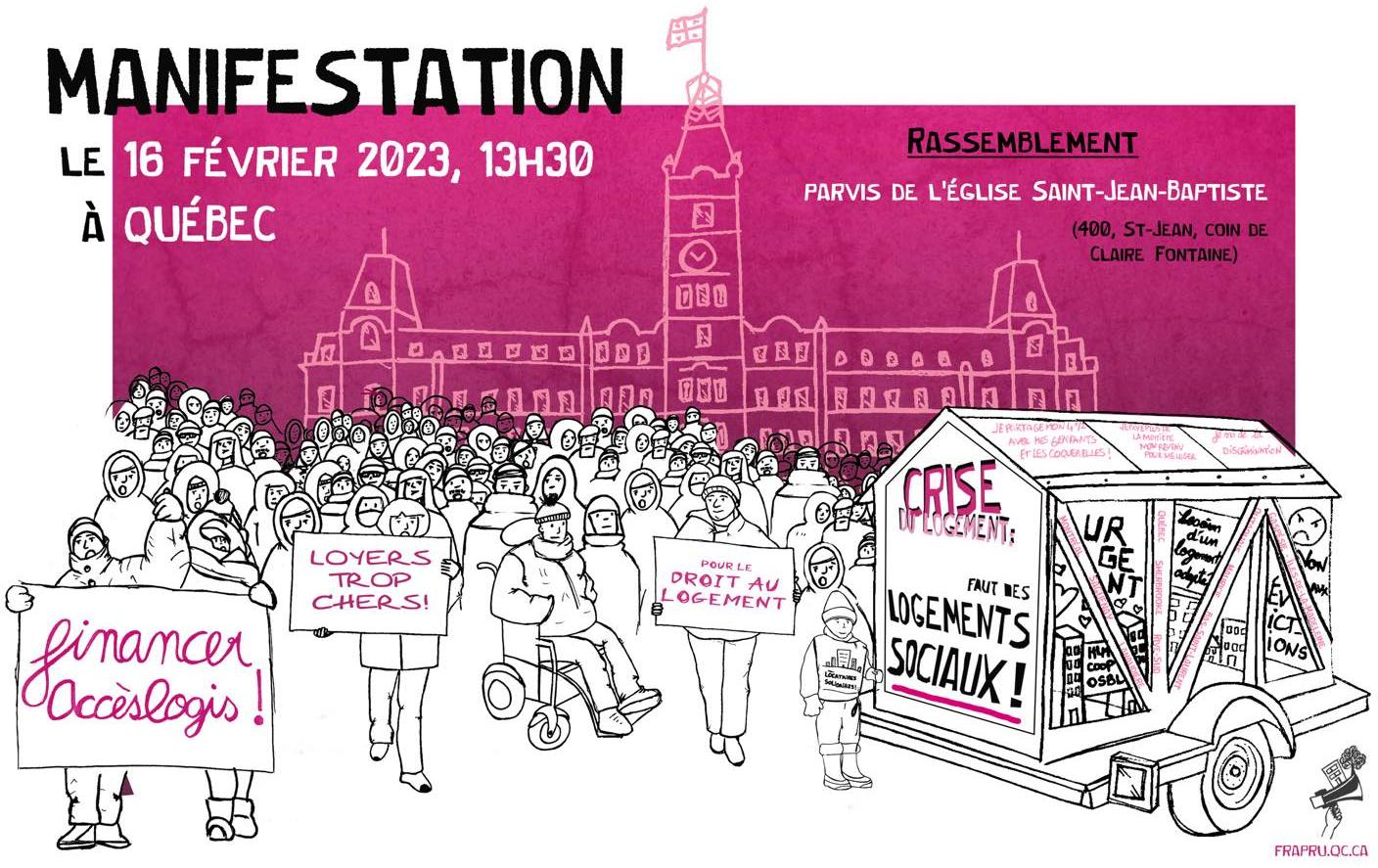February 15, 2023 - No. 3
Housing Is a Human Right!
Quebeckers Rally to Demand
Social Housing Now
|
• Legault
Government to Allow Rent
Increases in
Private Seniors' Residences
Housing Is a Human Right!
Quebeckers Rally to Demand Social Housing Now
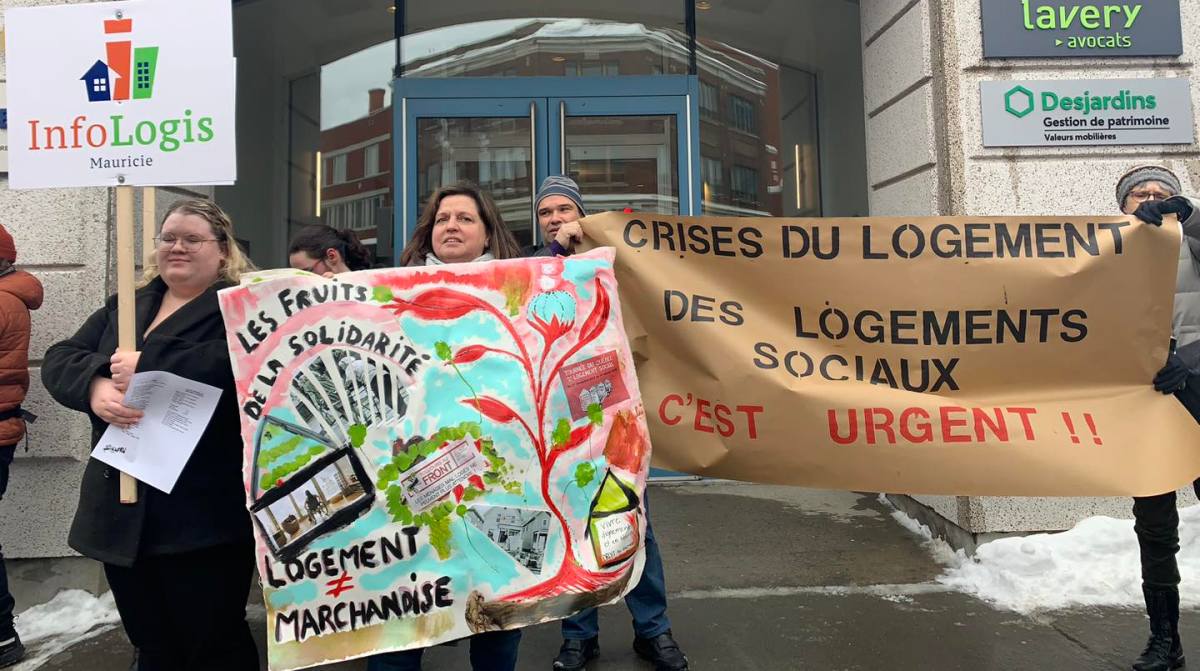
In the face of the worsening housing crisis in Quebec, as across the country, the People's Action Front on Urban Renewal (FRAPRU) has been touring communities throughout Quebec and holding actions in front of the offices of members of the Quebec national assembly. Accompanying the tour is a float which represents the housing needs and the social housing projects carried out by the different communities along the route.
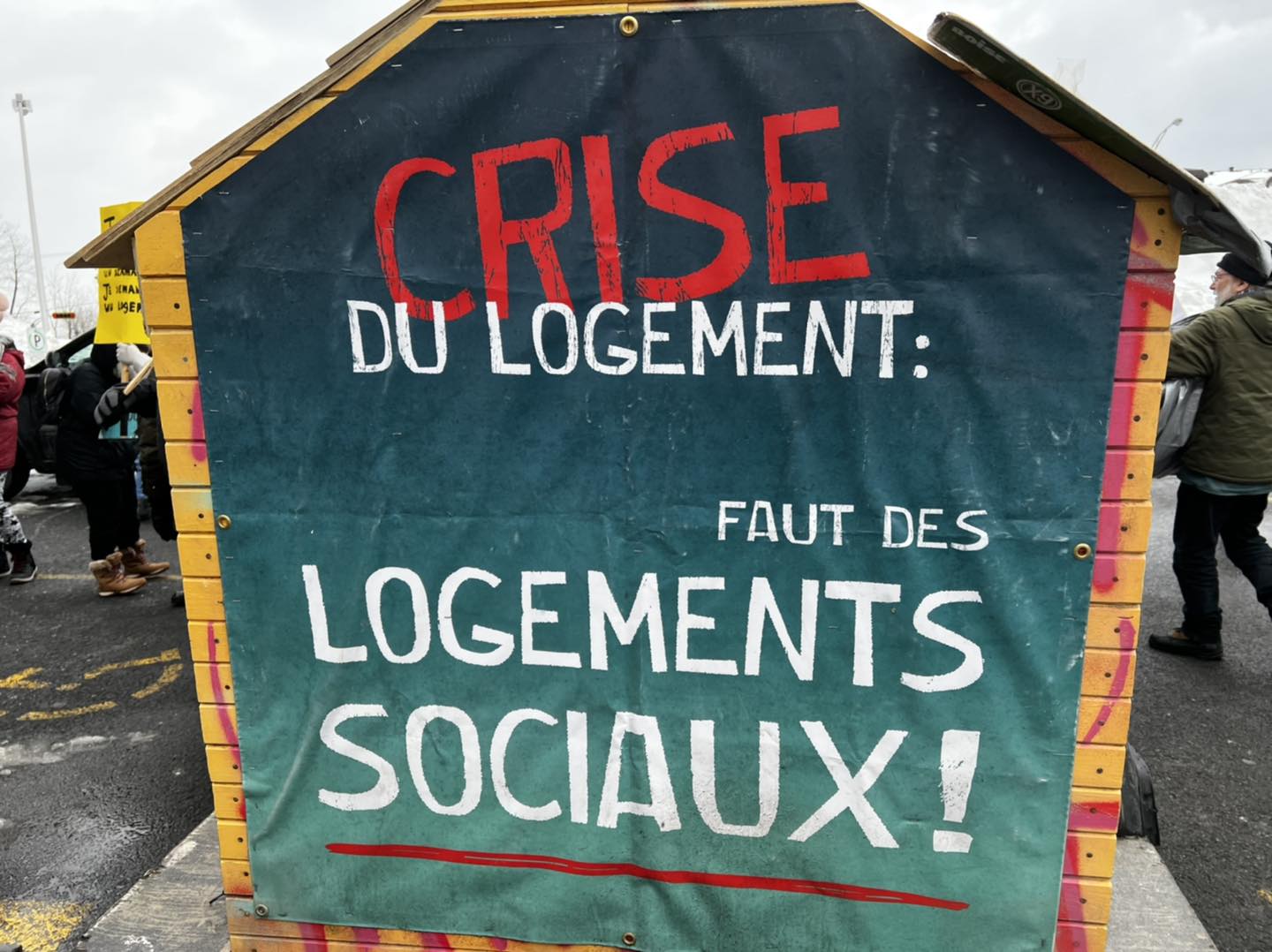 They are demanding the Quebec
government take up its
obligations to implement and protect the right to housing by
financing
the construction of 50,000 units of social housing over the next
five
years, starting with 10,000 units in 2023-24. They have also
called for
improved emergency measures for
homeless households.
They are demanding the Quebec
government take up its
obligations to implement and protect the right to housing by
financing
the construction of 50,000 units of social housing over the next
five
years, starting with 10,000 units in 2023-24. They have also
called for
improved emergency measures for
homeless households.
Vigorous actions took place in Saguenay-Lac-Saint-Jean, Montreal, La Rive-Sud, Bas-Saint-Laurent, Estrie, Outaouais, Lanaudière,Trois-Rivières, Mauricie, Assumption, Quebec City and many other places. The tour, which started in November 2022, concludes February 16 with a rally in front of the Quebec National Assembly. Everyone is encouraged to join in.
FRAPRU points out that social housing is a sustainable response to the current housing crisis but due to a lack of investment by the Quebec government, barely 5,000 units of social housing, in the form of public housing, cooperatives and seniors residences, have been built in the last four years. This is the least units per annum constructed since 1997.
(Photos: FRAPRU)
Housing Crisis in Quebec
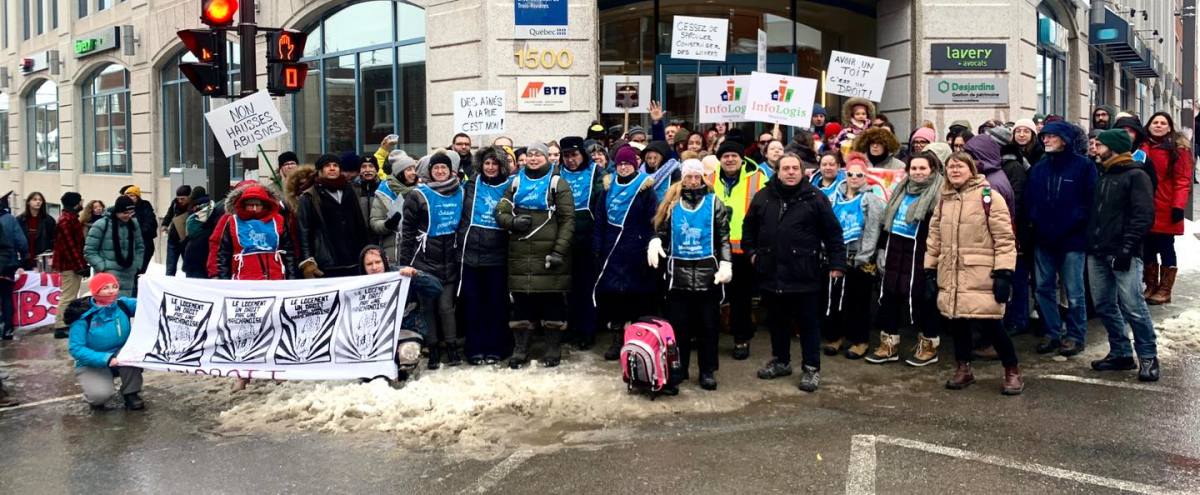 Trois Rivieres, Housing rights action, February 8, 2023.
Trois Rivieres, Housing rights action, February 8, 2023.
The housing crisis in Quebec is taking on unprecedented proportions at the beginning of 2023.
On January 27, the People's Action Front on Urban Renewal (FRAPRU) issued a press release following the tabling of the Canada Mortgage and Housing Corporation's Rental Market Report on January 26. The organization wrote: "Not only are vacancy rates dropping dramatically, but rent increases keep accelerating. We are not far from a perfect storm, if we also take into account the high number of evictions due to speculation. The coming year will be extremely difficult for the right to housing, everywhere in Quebec."
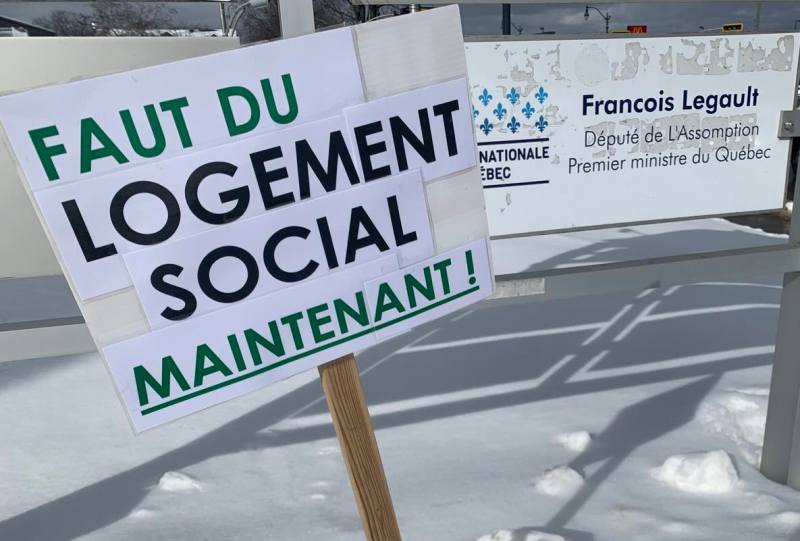 As
a result, vacancy rates are now below the equilibrium level of three
per cent in all of Quebec's metropolitan areas. Province-wide, it has
dropped from 2.5 per cent to 1.7 per cent. In Gatineau, it fell to 0.8
per cent. In Saguenay, Sherbrooke and Trois-Rivières, it is 0.9 per
cent. In Quebec
City, it has dropped to 1.5 per cent and in the Montreal metropolitan
area, it is two per cent. In large family apartments with three or more
bedrooms, the rate is 0.1 per cent in Saguenay and 0.2 per cent in
Gatineau.
As
a result, vacancy rates are now below the equilibrium level of three
per cent in all of Quebec's metropolitan areas. Province-wide, it has
dropped from 2.5 per cent to 1.7 per cent. In Gatineau, it fell to 0.8
per cent. In Saguenay, Sherbrooke and Trois-Rivières, it is 0.9 per
cent. In Quebec
City, it has dropped to 1.5 per cent and in the Montreal metropolitan
area, it is two per cent. In large family apartments with three or more
bedrooms, the rate is 0.1 per cent in Saguenay and 0.2 per cent in
Gatineau.
With one exception, the 38 other urban centres in Quebec are also affected by the shortage of rental apartments and, in 25 centres, the vacancy rate is less than one per cent. In Gaspé, Roberval and Sainte-Sophie, the vacancy rate is actually zero per cent. In Drummondville, Granby and Rimouski, where the situation was very tense in the summer of 2022, the rate is still very low at 0.4 per cent. Since January 1, the Sherbrooke Tenants' Association reports about 30 evictions and repossessions.
The voices of organizations defending the right to housing are being raised throughout Quebec to denounce this unbearable and unsustainable situation for Quebeckers.
Since November 2022, FRAPRU has been crisscrossing the regions of Quebec with its float to make visible the needs of tenant households in distress. "We want to illustrate the needs of tenant households because the housing crisis is hitting hard," says Catherine Lussier, community organizer at FRAPRU, mentioning the low number of available units, rent increases, evictions and repossessions.
F Clause in Residential Leases
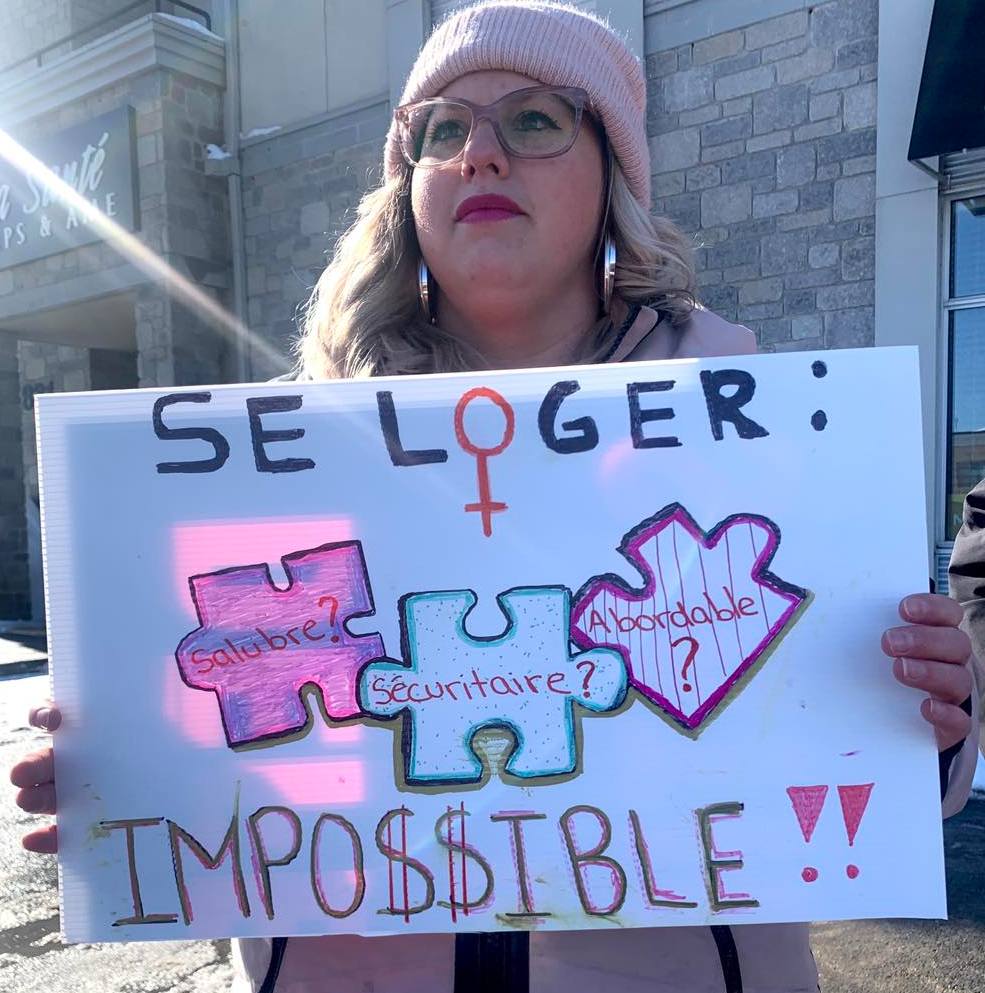 Also
contributing to the housing crisis is the existence of the F Clause in
residential leases, in place since 1980. For housing in a new building
or housing in a building that has recently had its use changed, it
gives landlords a five-year period in which rents can be increased
without limit
and without tenants having recourse to the Administrative Housing
Tribunal (TAL) to contest rental increases. Its purported aim is to
permit landlords to recoup the cost of building new housing.
Also
contributing to the housing crisis is the existence of the F Clause in
residential leases, in place since 1980. For housing in a new building
or housing in a building that has recently had its use changed, it
gives landlords a five-year period in which rents can be increased
without limit
and without tenants having recourse to the Administrative Housing
Tribunal (TAL) to contest rental increases. Its purported aim is to
permit landlords to recoup the cost of building new housing.
As just one example, the newspaper 24 Heures reported that in 2022, a family with three children living in Sainte-Marthe-sur-le-Lac in the Laurentians had their monthly rent increased by $725, from $1,475 month to $2,200, a 50 per cent increase. This was after one year of tenancy in their house that was built less than five years ago. This is unsustainable.
Anti-Social Offensive
Over the past 30 years, the Quebec government has imposed its anti-social agenda of destroying social programs of all kinds. The Régie du logement, which once provided some protection against rent increases, landlord abuse, unhealthy housing, etc., has been dismantled. It has been replaced by the Administrative Housing Tribunal which does not meet today's requirements.
The government says it provides "assistance" of all kinds. There is a shelter allowance program specifically for people 55 years of age and older whose rent or shelter costs exceed 30 per cent of their income. Low-income individuals or families can receive financial assistance through the Shelter Allowance program under certain conditions.
So on the one hand there is the F clause that favours landlords and on the other hand there is arbitrary "assistance" for tenants. These contradictory measures do nothing to solve the housing shortage, evictions, low quality housing and unlimited rent increases. The ruling circles claim that the housing shortage is caused by, among other things, the increase in the number of migrants, the aging population and a higher proportion of people living in urban centres. This so-called explanation is not new, nor does it assist anyone to deal with today's reality. The issue is that Quebec needs new arrangements that will guarantee this right for all.
The right to housing is a fundamental right for every human being to live his or her humanity, to house themselves and their families decently. Housing must be healthy, well insulated, affordable, provide peace of mind and security, and this, in the specific conditions of Quebec, adapted to the weather conditions. The need for new arrangements to guarantee this right has been put on the agenda by the working people of Quebec.
(Photos: FRAPRU)
Legault Government to Allow Rent Increases in Private Seniors' Residences
A draft regulation was submitted to the Quebec Cabinet in January to allow owners of private seniors' residences (RPAs) that provide nursing or other services to raise rents. The regulation was published in the January 25 issue of the Gazette officielle, the official newspaper of the Government of Quebec. The government can adopt it 45 days after the date of publication.
The proposed regulation calls for a an increase to rents in RPAs based on "a percentage applicable to service charges that relate to the individual tenant," said to take into account annual inflation in the cost of services provided to residents. This increase would be in addition to rental increases that apply to all rental housing. Services that seniors in RPAs can opt to receive include: meals; domestic help; personal assistance (getting dressed, hygiene, medication); recreational activities; nursing care. The cost of these services is added to the rent and specified in the lease. The average rent an RPAs in Quebec in 2022 was $1,722 for a single room, $1,515 for a studio; and $1,820 for a single bedroom apartment, according to the website logisretraite.com. None of these figures include service fees, which vary from place to place.
Currently, the Administrative Housing Tribunal's (TAL) calculation for recommended rent increases is the same for seniors' residences and traditional rental housing. For example, the TAL's rent increase recommendations for 2023 are: 2.3 per cent for leases that do not include heating; 2.8 per cent for leases that include electric heating; 4.5 for leases with gas heating; and 7.3 for leases that include the use of heating oil. Activists for the right to housing say landlords rarely respect the TAL's recommendations, while the Quebec landlord's association has said the tribunal's recommendations are not high enough.
Since January 2021, more than 300 RPAs have closed in Quebec, a number that continues to grow, in a context where many seniors' residences are struggling to make ends meet. More than 18 per cent of Quebeckers over 75 years of age live in an RPA, according to the Canada Mortgage and Housing Corporation.
During the first session of the National Assembly on January 31, France-Elaine Duranceau, Minister responsible for Housing, declared: "This measure was intended to help RPAs. As you know, in the last five years, 400 RPAs have closed, or close to it. So this is a measure to help RPAs.
"I think we have to be careful not to scare seniors with this measure. It is a very technical measure, which aims to calculate the rent that can be charged in RPAs. There is an indexation of the rent that will be for the services portion. We are changing the index that is used for an index that is for human services. We want to reflect the costs that RPAs incur. That's the landlord side, if you will."
The pandemic brought into stark relief the crisis in the health care system, in seniors' residences and in the care our seniors are entitled to receive. The consequences of the progressive disinvestment imposed for years by neo-liberal governments with the pay-the-rich schemes are seen in every sphere.
Today, the government is continuing in the same direction, dehumanizing the situation of seniors and reducing the matter to a question of increases to allow RPAs to cope with the rising cost of living.
New arrangements with a vision for the well-being of our seniors are needed.
(To access articles individually click on the black headline.)
Website: www.cpcml.ca Email: editor@cpcml.ca

